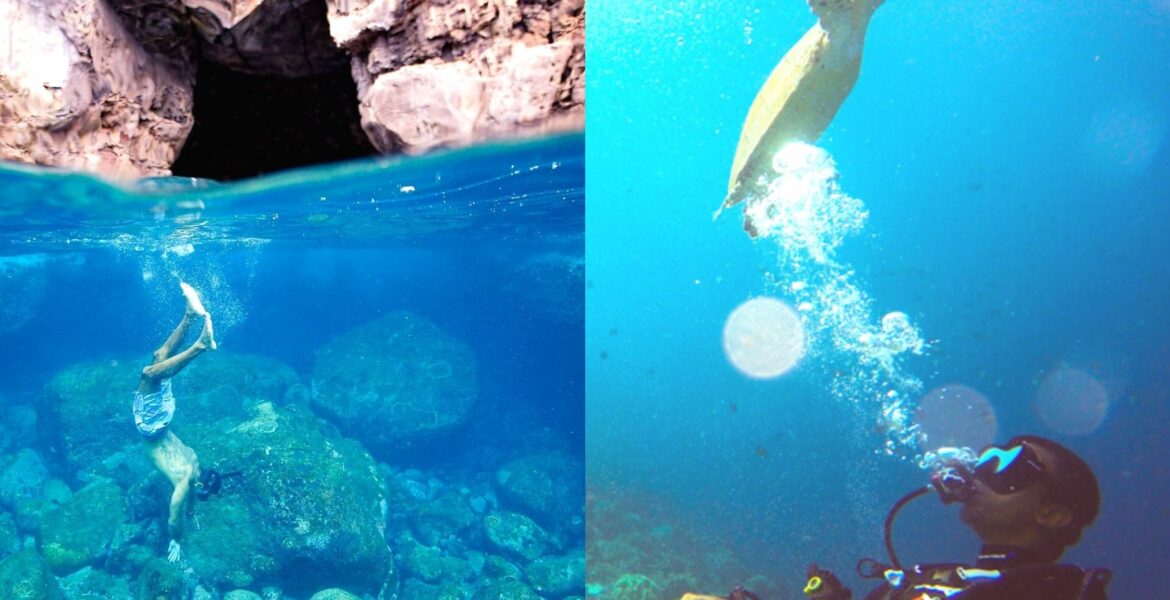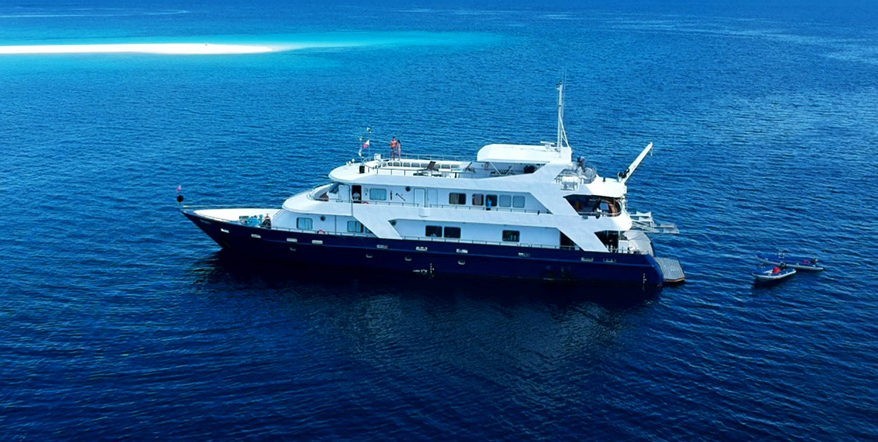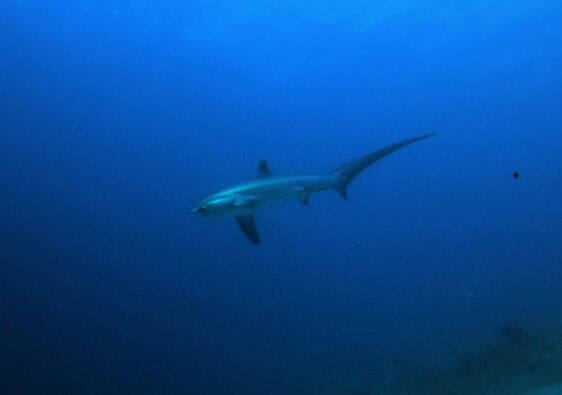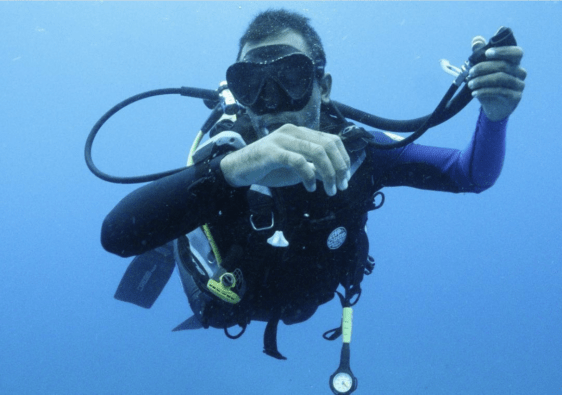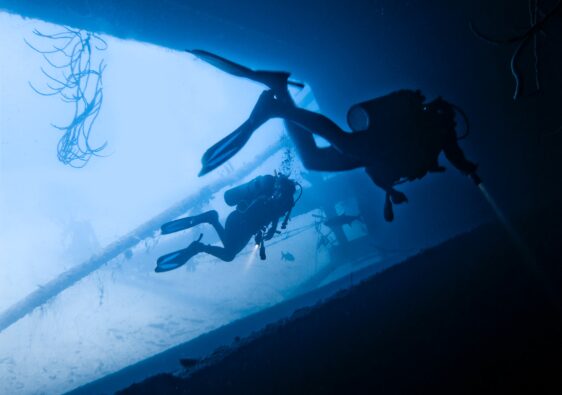I have been enjoying both freediving and scuba diving for a while now. Both have provided me with amazing experiences in the ocean.
If you are wondering how they differ, the short answer is that has nothing to do with breathing as many would say. The difference between scuba diving and freediving is that scuba diving is externally focused whereas freediving is internally focused.
To choose which one would suit you best, let us explore the main differences between scuba diving and freediving.
** Disclaimer: We’ve added affiliate links to this post for you to easily find the right products for you. Using the links below comes at no cost to you and helps us run OceanVibration through affiliate commissions. We only suggest products that we use and love ourselves! **
The point of view
Scuba diving provides an amazing experience if you want to explore the underwater world. Whether it is for marine life, the underwater landscapes, or just the feeling of being part of the ocean, scuba diving provides it all.
The whole point of scuba diving is to explore and discover what the ocean has to offer. It is mainly a visual experience of your surroundings.
Freediving on the other hand is not a journey with an outward perspective. You may want to free dive for ‘x’ or ‘y’ reasons, whether it is like me out of curiosity, or like a lot of freedivers, for spearfishing. But you will soon find out that freediving submerges you into an unexpected world; the world within.
As a freediver, you will focus inwards. The whole world that you end up exploring is the world within. In order to lose yourself to the deep, you will often close your eyes. And even if you don’t do so, the water at depth gets pitch black.
Whichever catalyst brought you into freediving, you will always end up continuing for the same reason. That is the exploration of yourself, your mind, and your thoughts.
Breathing when scuba diving vs freediving
Scuba diving requires you to breathe underwater from a gas cylinder. Breathing is actually very important for you when scuba diving. Holding your breath can cause serious injuries and even fatalities such as lung expansion. This occurs when you hold your breath and the air in your lungs expands.
On the complete opposite side, when freediving, you need to hold your breath. The full intake of air at the surface before diving will provide all of the oxygen you’ll use during your dive.
How long will you spend underwater when freediving vs scuba diving?
When freediving, you won’t spend more than 2 minutes underwater generally speaking. That said, you need to take something really important into account; how long those 2 minutes feel like. And I can tell you, it can feel like an eternity. The only thing that will remind you of the concept of time when you free dive are contractions. That is your body telling you that there is an excess of the Co2 build-up in your system. When you learn to manage that, time stops; if only for a moment.
Scuba diving provides, in general, 45 minutes of pure joy underwater. That is all depending on how deep you dive and which gas mixture you use. But let’s not get too technical here. I have done many dives where I’ve spent a good hour plus underwater with a normal 21% gas. I have to admit that sometimes, after 45 minutes, the dive can start to feel long, especially when there’s not much to see.
The limits of time underwater are also being pushed rapidly with the advance of CCR (closed circuit diving) or rebreather diving. This allows a scuba/rebreather diver to spend up to 3 hours underwater.
How deep can you dive as a scuba diver and freediver?
The deepest dive record held in scuba diving is 332 meters whereas, in freediving, the deepest dive record is 214 meters.
Now, hold your horses a second, and don’t get over-excited. Record-holding is another beast of its own and many have died in the process of breaking those numbers.
For the 99.9% of us, we can consider a deep dive in scuba diving being at 50 meters, and a good depth in freediving at 30 meters.
An important fact to take into consideration is that if you are a ‘natural’ freediver, and it comes easy to you, you can easily free dive to 30 meters in a few days of training. On the other hand, scuba diving to 50 meters requires a lot of dives, training, and certifications.
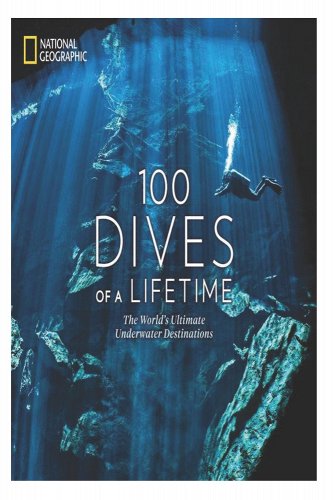
In my opinion, the best stuff to see while scuba diving is between 15 and 30 meters, anyway. You only need to be advanced certified for that, which is easily accessible.
Freediving is not at all about depth (if you take your ego away). It is about experiencing the moment. Two different freedivers may feel the same way at 15 meters and 45 meters respectively. More importantly, two different divers will face the same issues at different depths. Someone that can easily dive to 30 meters will face the same mental blocks at 31 meters as someone at 61 meters that can easily dive to 60 meters.
Either way, depth is not what you should be taking into consideration when looking into freediving or scuba diving.
Scuba diving lifestyle vs freediving lifestyle
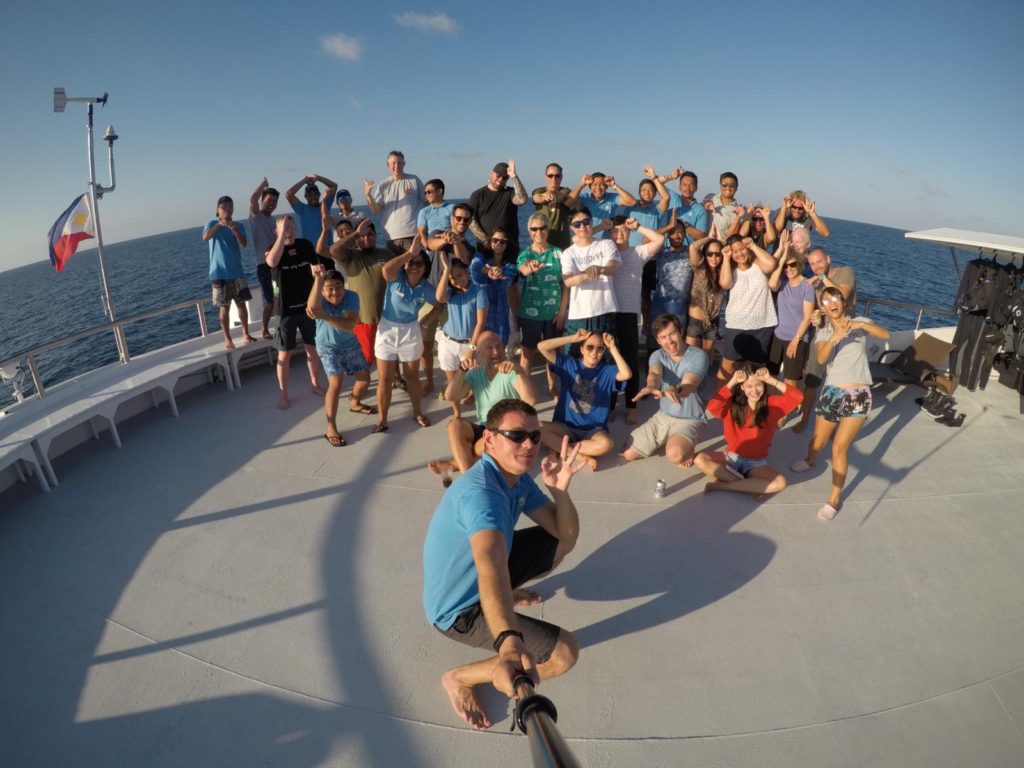
Yes! As weird as it may sound to you, it is very important to take into consideration the difference in lifestyle when looking at choosing between scuba diving and freediving.
Of course, I am going to be quite general in my approach here. Everyone is different and each to his own. But it is a fact that despite what you can read from the different dive agencies, you don’t need to be in super good shape to be a scuba diver.
A scuba diver’s lifestyle is more hedonistic, the scuba diver will often indulge in a nice fresh beer after a dive. The practice of scuba diving doesn’t require such a lifestyle where you need to be fit. The open water scuba diver swimming test for example requires you to swim 300 meters. You can think of it as a fair distance but it does also say that it is at your own pace and using a mask, fins, and tuba.
Freediving is a completely different beast of its own when it comes to lifestyle. Not all freedivers are the same, especially when it comes to spearfishermen. But in most cases, freediving will gently guide you towards a healthier lifestyle. Matter of fact, when you get hooked, you will want to put everything on your side to have an easier dive and a better experience underwater. This will bring many changes in your life like eating healthy, learning to breathe, meditation and mindfulness to name a few.
Is scuba diving more technical than freediving?
By technical, here, I mean whether there is a lot to learn and to deal with while diving. And the answer is yes. There is a lot more to deal with, pay attention to and manage as a scuba diver.
As a scuba diver, you need to manage first of all your gear. That is your BCD (buoyancy control device), your dive computer, and where you actually hooked all kinds of stuff. You then need to manage your actual buoyancy, the current, the amount of air left in your tank, your CNS (Central nervous system toxicity), and the list goes all.
Freediving is not technical at all. You learn the breath-up, a good duck dive, and a good finning technique; it is ‘free’ in all possible ways. When freediving, your body tells you where you are at in terms of CO2 build-up through contractions. You then only need to manage your brain; and nope, it’s not that easy!
Does freediving gear cost more than scuba diving gear?
Freediving gear, like everything, can be quite expensive depending on brands and quality. But the sheer amount of gear you need as a scuba diver greatly exceeds that of a freediver and thus adds up to much more.
You need to remember that you can free dive with just a mask and swimming trunks. You don’t even need fins!
A scuba diver that wants (and should in many cases) own his own gear will have to spend on pretty much everything from the regulators’ first stage to the fins; head to toes in every single way.
Do you need to get certifided for scuba diving and freediving?
Getting certified for scuba diving is a must, there is no way around it. Unless you happen to own all the material needed including a gas compressor to fill your cylinders, you will need to go to a diving center to be able to scuba dive. Any decent scuba diving centers will refuse to let you dive unless you have the right certification, else they will tell you to get certified with them. That’s for 2 main reasons, insurance policies and making a sale on a course.
If you want to free dive on the hand, you just need to head to the beach, swim out at sea, and dive. Certification will not be needed unless you actually go and dive with a registered freediving school/center.
That said, getting proper training with a registered school is essential to safe freediving practice, not only for you but also for the people you dive with. Your life and your buddy’s life are worth more than you may think, and you’ll make great friends while getting all the good tips.
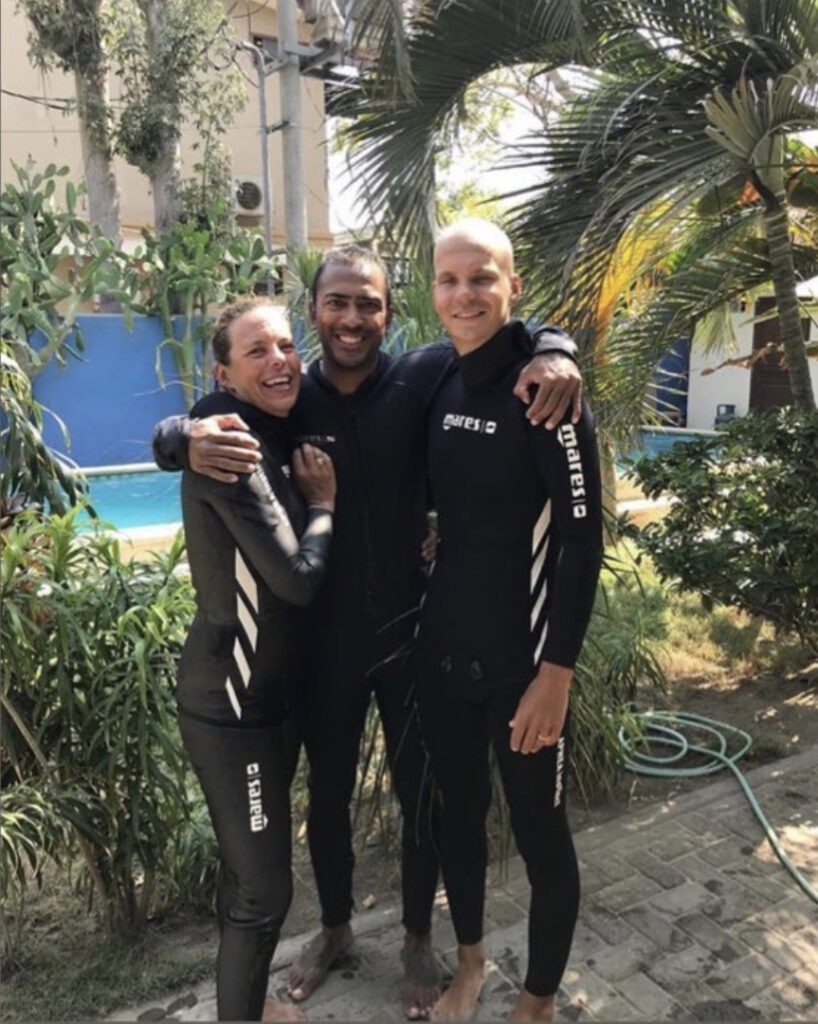
Is freediving safer than scuba diving?
That is an interesting question that I often get from friends and people intrigued by the ocean. The simple answer is that any activities in the ocean come with a high level of risk. Whether it is open water swimming, surfing, freediving, or scuba diving, the ocean is not to be messed with.
Some people refuse to scuba dive because of the dependency on their equipment to work properly. I often get the question ‘What if your ….. fails at 20 meters?’ and my answer is always the same; ‘you never dive alone’. Those questions arise from those who haven’t dared to try. Scuba diving is a well-regulated sport, and the safety measures in place are as such that when your air hose blows up, you get air from your dive buddy.
If you find that you hesitate to do things due to uncertainties, read my post The 80/20 Theory – Dealing with uncertainties.
On the same line of thought, people will tell you that freediving is safer because you don’t rely on anything other than yourself. Well, let me tell you that nowadays human error is more common than anything else. As a freediver, it is easy to misinterpret your contractions or to misjudge your capacity on any specific day, which can lead to a fatality. Again, you should never dive alone, and always with someone that knows what they are doing (followed a certified course).
I truly think that freediving can be more dangerous. Mainly because, as mentioned above, you can just pick up your fins and go diving. It is so easily accessible that it can lead to some people not taking the precautions required when dealing with the ocean.
Scuba diving or freediving if you suffer from claustrophobia?
Scuba diving is far better than freediving if you suffer from claustrophobia because it gives you more leeway to manage the situation.
Despite all the gear that you have to wear, scuba diving will allow you to go down at your own pace. Your body position will also play an important role as you can swivel and look around, not necessarily looking into the deep.
You should talk to your divemaster, who will choose the appropriate dive site for you, where you will feel the most at ease. People tend to visualize scuba diving as just jumping straight into the deep blue. This is rarely the case! You will start by diving in the shallows and diving into 8-10 meters of crystal clear water you give you a lot of spatial freedom.
Freediving on the other side is much more about diving head down into the deep. To make things worst, you won’t be breathing. Regulating your breath is key to calming yourself down.
Is freediving better than scuba diving if you have general health issues?
I highly recommend freediving if you have general health issues but check with your doctor first!
The lifestyle of a freediver is clean and healthy and includes practices like yoga, meditation, and healthy eating. Diaphragmatic breathing is one of the many skills you will learn and included in your daily life as a freediver. Learning how to breathe properly, which is essential to apnea, will help with an array of common illnesses such as inflammation in the body, possibilities of having a stroke, insomnia, low immunity system, just to name a few.
Scuba diving on the other hand can be dangerous and aggravate health issues due to the air exchange at depth. The partial pressure of the different gasses (21% oxygen, 78% nitrogen, 1% inert gas) creates reactions within your system under pressure. That said, I personally scuba dive with asthma and a severe neck injury. In any case, do consult your doctor prior to considering scuba diving.
All in all, freediving is the way to go as its practice will be beneficial for your in and out of the water. Learn more about the amazing world of freediving with the fascinating book DEEP by James Nestor.
Does scuba diving offer a better interaction with marine life than freediving?
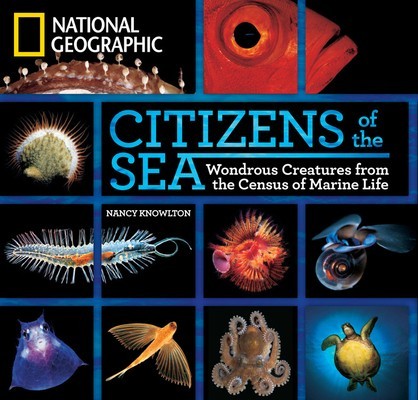
Both freediving and scuba diving offers a great opportunity to interact with marine life and neither is better or worse than the other in that aspect; just different.
First of all, we have to consider that when scuba diving, you are blowing out bubbles which is uncommon in the underwater world. That will make the fish and other marine species extremely suspicious of you, limiting your interaction with them.
Freediving on the other hand fully allows being part of the underwater world. I love the interaction with marine life when I free dive. You can see that animals underwater can be very curious.
That said, scuba diving gives you plenty of time underwater whereas you will be seriously limited as a freediver. I remember my first dive with sharks was with Thresher sharks in Malapascua, and I had the chance of having one of the sharks getting really close to me as a scuba diver because I spent enough time underwater for it to feel more at ease.
Another important factor to consider when choosing between scuba diving and freediving is the freedom of movement. A scuba diver is pretty bulky with all the equipment he carries which makes it very hard to follow or get to animals that you want to see. This is a very common issue when trying to interact with marine mammals.
If you want to interact with marine mammals freediving is 100% the way to go!
What type of diving for underwater photography?
Scuba diving offers much more freedom for underwater photography than freediving. This is due to the amount of time that you have as a scuba diver. This increased time underwater allows you to set yourself up perfectly for a shot.
Scuba diving is the way to go for macro photography and general underwater photography but if you want to go marine mammals, again, freediving will be the best choice due to the ease of movement and better interaction with the marine life.
Conclusion
Choosing between freediving or scuba diving is purely a personal choice as both come with their advantages and disadvantages. I started scuba diving before freediving and still practice both to date. My scuba diving sessions are planned ahead whereas my freediving sessions are often on a whim, and both are essential to my exploration of the ocean.
Now what is your conclusion? Which one are you going for? Share your decision in the comments below.
You can also check out my other guides on the same topic:

